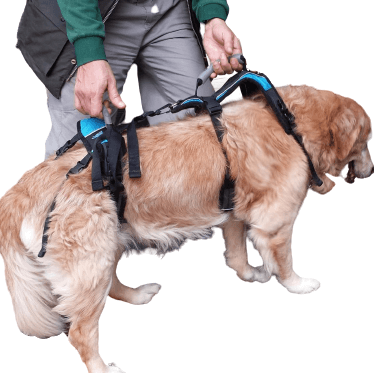
Stages of osteoarthritis and conservative management
It’s not just older pets who get arthritis. Pets of all ages, particularly larger breeds and obese pets, are more likely to develop it.
Healthy Knee Joint
Your dog can walk, run, play and climb freely.
- Bone is strong and dense
- Cartilage is intact
- Ligaments and tendons are resilient

Early OA
Your dog has some pain and may start lagging behind on walks.
- Bone Deterioration begins
- Cartilage starts to breakdown
- Ligaments and tendons weaken

Moderate OA
Your dog is slow to rise and climbs with difficulty.
- Bone deterioration worsens
- Cartilage erodes
- Ligaments and tendons inflamed

Advanced OA
Your dog needs help rising and has trouble walking.
- Bone to bone contact
- Cartilage breaks off
- Ligaments and tendons lose elasticity and are severely inflamed

Mild / early Arthritis
Signs and symptoms of mild arthritis include:
- Slower to get up from a sitting or lying position
- A more ‘careful’ attitude when standing, sitting, or walking upstairs
- Less interest in exercise or playtime
- Weight gain due to a decrease in physical activity
Mild arthritis can be very difficult to detect. Dogs, cats & rabbits have evolved to hide their pain, so you are unlikely to even notice the symptoms. If your pet has mild arthritis, an exercise programme and supplements support to slow this progression. Veterinary physiotherapy will include tailored exercises to support the affected joint(s) and supplements. We recommend veterinary products with glucosamine & chondroitin in appropriate levels and high dose Omega 3 essential fatty acids from fish source.
Moderate Arthritis
Mild arthritis eventually deteriorates to moderate arthritis. In general, this is the stage when the pain and/or lameness become visible to the owner. Your pet may be reluctant to run, jump on the sofa, or go upstairs. He may even hop a bit to avoid flexing the joints. Other symptoms of this stage include:
- Limping or lameness, particularly first thing in the morning or after a nap
- Joint sensitivity
- Irritability
- Increased pain and stiffness in cold or damp surroundings
Moderate arthritis can impact your pet’s quality of life. He seems less energetic, more listless, and doesn’t enjoy his old activities. When your pet is in this stage, light exercise such as swimming in dogs, is beneficial. Make sure he is comfortable by providing stairs or ramps where needed, and a warm and cosy bed. Veterinary physiotherapy may include pain management such as therapeutic laser, Assis Loop and a review of therapeutic exercise and supplements.
Severe / advanced Arthritis
A pet with severe arthritis can be in a lot of pain if not treated appropriately. Your veterinarian should be able to help you develop a medical and diet routine to minimize the pain. Pets with severe arthritis may:
- Have a pronounced limp
- Avoid walking on hardwood floors or hard surfaces
- Be unable to go up or down staircases
- Move as little as possible
Pain medication may be needed alongside Veterinary physiotherapy – regular massage, thermotherapy, therapeutic laser with exercise modification in addition to supplements. Acupuncture (or acu-laser-puncture) may also help improve pain management in pets with severe arthritis.
相關產品
This site is protected by reCAPTCHA and the Google Privacy Policy and Terms of Service apply.










